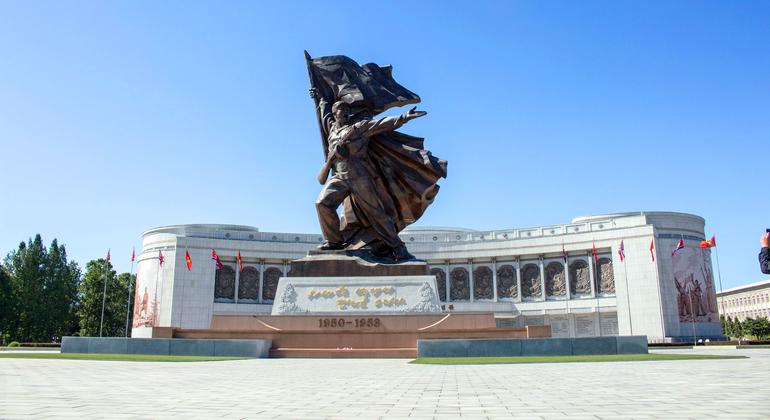
Assistant Secretary-General Khaled Khiari, who briefed the Council on Monday afternoon, reiterated the UN Secretary-General’s strong condemnation of the launch and his appeal for action to reduce tensions on the Korean Peninsula.
“The Secretary-General deeply regrets the divisions that have prevented the international community from acting on the DPRK, as well as on other threats to peace and security around the world.” he said. “The Korean Peninsula must be an area for cooperation.”
Comply with obligations
The Council meeting was held after the DPRK announced that it had fired a long-range ballistic missile on Saturday that flew nearly 990 kilometres and landed in the Sea of Japan.
This was followed on Monday by what Pyongyang termed a launching drill involving two “tactical nuclear” rockets.
“The Secretary-General reiterates his calls on the DPRK to immediately desist from taking any further provocative actions, to fully comply with its international obligations under all relevant Security Council resolutions, and to resume dialogue leading to sustainable peace and the complete and verifiable denuclearization of the Korean Peninsula,” Mr. Khiari said.
Nuclear pursuit continues
He noted that the DPRK has clearly stated its intention to continue to pursue its nuclear weapon and ballistic missile programmes in violation of Council resolutions.
The country continues to implement a five-year military plan, unveiled in January 2021, which provided for developing new intercontinental-range ballistic missiles, among other weapons.
The DPRK has also repeatedly warned of so-called “counteractions” to military exercises carried out in the region and has described the Council’s meeting last week on non-proliferation as a “hostile act that the DPRK is bound to take due counteraction”, he added.
Security Council’s role
“Today’s meeting reaffirms that the Security Council has primary responsibility for the maintenance of international peace and security,” Mr. Khiari said.
“The meeting also provides an opportunity to discuss practical measures for achieving a peaceful, comprehensive, diplomatic, and political solution to the situation on the Korean Peninsula.”
He recalled that the DPRK “greatly increased” missile launch activities last year, 70 of which used ballistic missile technology.
The launches were characterized as involving systems with nuclear weapon roles. Most of the systems tested are capable of striking targets on the Korean Peninsula, and some are capable of reaching parts of North America.
Nuclear-weapon-free goal
The DPRK also approved a new law in September which set out conditions in which it could use nuclear weapons, including pre-emptively in certain circumstances.
“A seventh nuclear test would be a flagrant violation of Security Council resolutions and undermine the international norm against nuclear testing. The Secretary-General remains firmly committed to achieving the goal of a world free of nuclear weapons,” he said.
Mr. Khiari told the Council that the situation on the Korean Peninsula continues to head in the wrong direction, amid increasing tensions due to “the negative action-reaction cycle, with no off-ramps in sight”.
Reduce tensions, avoid escalation
He outlined three steps towards reducing tensions.
“First, the DPRK needs to take immediate steps to resume dialogue leading to sustainable peace and the complete and verifiable denuclearization of the Korean Peninsula; this should include the DPRK refraining from carrying out further launches using ballistic missile technology or nuclear tests,” he said.
Welcoming the Council’s commitment to a peaceful, comprehensive, diplomatic and peaceful solution, he said the second step highlights that diplomacy, not isolation, is the only way forward.
“It is critical to avoid an unintended escalation,” said Mr. Khiari, introducing his third step. “Communication channels must be enhanced, particularly military to military. Avoiding confrontational rhetoric will help to lower political tensions and create space to explore diplomatic avenues.”
Humanitarian concerns
Before concluding, Mr. Khiari once again highlighted UN concerns over the humanitarian situation in the DPRK.
“The United Nations is ready to assist the DPRK in addressing medical and other humanitarian needs,” he told Council members. “To allow for a timely and effective response, we reiterate our call for the unimpeded entry of international staff, including the Resident Coordinator, and humanitarian supplies.”



